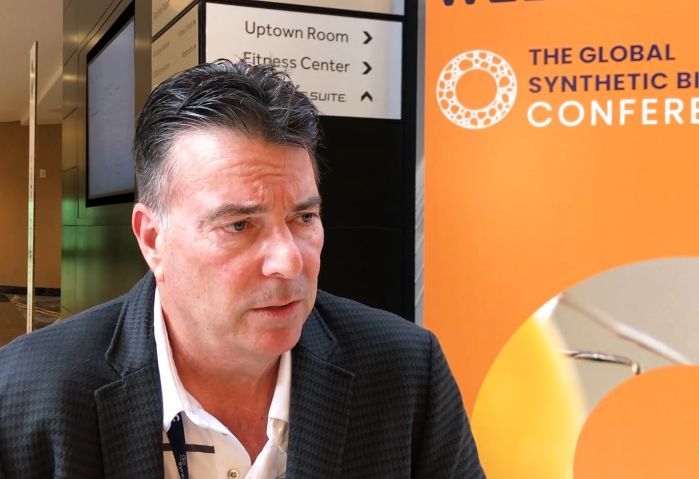Microbiome health startup Verb Biotics is gearing up to launch its first products in the first quarter of 2024, two and a half years after it was spun out of synthetic biology company Ginkgo Bioworks.
Launched in September 2021 with $30 million in funding from Viking Global Investors and Cascade Investment, Verb Biotics engineers ‘precision biotics’ for foods and supplements with ‘measurable effects that consumers can feel.’
While there’s no shortage of ‘biotics’ targeting immunity and digestive health, Verb is looking at a broader range of health areas and developing probiotics, postbiotics and synbiotics to support stress and mood, metabolic health, satiety, sports recovery, and women’s health, CEO Todd Beckman told AgFunderNews (AFN) at the SynBioBeta conference in California last month.
“There are limited applications for most probiotics, as they are not stable, and they are still mostly focused on immunity and digestive health,” said Beckman, who spent 13 years building consumer probiotics brand Goodbelly before becoming a strategic advisor to Gingko. “But consumers are looking for something more… they’re looking at how can I sleep better, how can I feel less stress?”
Most companies in the space start with an organism and then study it to determine potential health benefits, he said. Verb Biotics flips that around.
“We are very intentional and mechanistic, so we’re function-first, and we’re not tied into any one organism or flagship strains,” explained Beckman. We start with a health indication in mind, we try to understand the mechanisms of action to implicate that health condition, and then we find microbes and develop biotic solutions to achieve that health outcome.”
‘We have non-GM platform and a GM platform’
Working with Ginkgo, Verb Biotics screens millions of microbial strains to find candidates that naturally have “hidden gems of metabolite production or the characteristics we’re looking for,” said Beckman.
It is also developing synthetic biology approaches whereby it can write metabolic pathways into microbes to enable the production of target metabolites, he said.
“We have non-GM platform and a GM platform. With GM, we’re only going to use molecules and genes that are already in humans or have been in humans in the past. For example, as we’ve evolved, we’ve lost a lot of genes through changes in our microbiome. So as we deploy GM, it’s about taking those genes that were already in humans, and then putting them into safe GRAS [Generally Recognized as Safe] microorganisms.
“As our microbiome has shifted over time, there could be genes that are missing in our microbiome that limit what we can digest, for example, so someone might get a benefit from acai berries, but someone else may not be able to absorb those nutrients.
“So maybe we could replenish some of those important genes that help us digest food better, help us to stay healthier, help us maybe live longer. But where we use GM, we have to be safe, we have to be transparent, and it has to have already been in humans.”

WHAT ARE PROBIOTICS? According to the World Health Organization, probiotics are “live microorganisms that, when administered in adequate amounts, confer a health benefit on the host.” The benefits of these ‘good bacteria’ are strain-specific.
WHAT ARE PREBIOTICS? According to the International Scientific Association for Probiotics and Prebiotics (ISAPP), a prebiotic is: “a substrate that is selectively utilized by host microorganisms conferring a health benefit.”
Prebiotics are fermented in the large intestine, serving as ‘food’ for beneficial microbes that already live your colon or elsewhere in your body, and producing beneficial compounds such as short chain fatty acids. Examples include fructooligosaccharides (FOS) and oligofructose (OF) from chicory roots; galactooligosaccharides (GOS) from milk sugar; xylooligosaccharides (XOS) from sugar beet; human milk oligosaccharides (HMOs) in breastmilk; and resistant starches found in potatoes, unripe bananas, and Jerusalem artichokes.
WHAT ARE SYNBIOTICS? A mix of prebiotics and probiotics beneficial to the host (read the ISAPP definition here).
WHAT ARE POSTBIOTICS? A consensus statement from ISAPP defines postbiotics as “a preparation of inanimate microorganisms and/or their components that confer health benefits on the host.” Examples include EpiCor, a heat- and pH-stable yeast fermentate from Cargill made with a proprietary strain of baker’s yeast; and ADM’s HT-BPL1, a heat-treated version of its BPL1 probiotic that can be used in a wide range of food and beverage applications.
Targeted delivery and ‘bouquets’ of metabolites
Verb Biotics is working on multiple products for the food and supplements industry including probiotics, postbiotics, and synbiotics (combinations of prebiotics and probiotics), said Beckman.
“We’re also looking at stacking metabolites into what we call ‘bouquets,’ as what works for me might not work for you, as everybody’s microbiome is a bit different. So if we have metabolites that are important for say stress and mood, by stacking several of them we could provide a clinical effect across the broader population.”
Asked about the first two products, he said: “Currently we are in pre-clinical trials. We will begin two human clinical trials over the summer with a target completion in Q1, 2024. All studies will be peer reviewed with the end goal to be published in reputable journals and all products and ingredients will be GRAS. We do not foresee any issues with achieving GRAS on the products launching in Q1 2024.”
The first product—launching in the first quarter of 2024—will be a postbiotic “focused around providing key nutrients to keystone bacteria with the idea of producing important short chain fatty acids,” said Beckman. “The product has been designed to improve gut and digestive health. More than one mechanism of action will be delivered within this product, with the goal of delivering foundational improvements. We will have more detail on specific claims once the studies are completed.”
Unlike probiotics, which are ‘live’ microbes, postbiotics are inert, and can therefore be used in a wider variety of products that don’t need refrigeration or special processing conditions to maintain their viability, making them attractive to food and beverage formulators, he noted.
The second product will be a probiotic focused on stress and mood.
According to Beckman: “Our probiotics are developed to deliver payloads in the right place at the right time. So think about sleep and melatonin as an example. You want to have melatonin delivered to the right spot in your gut in the right amount for the right amount of time to help you sleep better.”

‘It’s really important that consumers feel the effects’
More generally, he said, “We’re looking at how can we go to market faster? How can we leverage clinical studies to be faster, to be more efficient, to get to market faster? As we’re in the consumer space, it’s really important that consumers feel the effects, so we will provide products that are highly efficacious and clinically backed.”
The lack of specificity in marketing around probiotics—with brands talking genetically about ‘probiotics’ or just listing the genus and species on pack, although the benefits are strain-specific, has also led to consumer confusion and distrust, he said.
“Another thing that’s happened over time is that a lot of marketers have gotten quite liberal about talking about CFUs [colony forming units] as if more is always better, or the number of strains in a product [as if more is always better]. But it’s not based on science, and consumers are really confused.
“We want to shift the conversation to what does this biotic actually do and how does it work? We want to give consumers a reason to believe.”

Designer probiotics: ‘If you drink ZBiotics before you drink alcohol, you wake up the next day feel better than you would have felt otherwise’
Speaking on a panel debate on microbiome health at the SynBioBeta conference, Dr. Zachary Abbott, founder of ‘designer’ probiotic startup ZBiotics, said he also saw significant opportunities to genetically engineer probiotics to deliver highly targeted benefits.
Founded in 2016, San Francisco-based ZBiotics has engineered bacteria to express an enzyme that breaks down acetaldehyde, an intermediate product in the metabolism of alcohol.
While the liver is pretty good at producing enzymes that break down alcohol into acetaldehyde and then convert it into acetate (basically vinegar), the gut—where some alcohol is also metabolized—does not do this quite as efficiently, said Abbott. Which is where ZBiotics comes in.
To make the probiotic, Abbott transferred a trait for acetaldehyde breakdown from the liver into a strain of bacteria (B. subtilis ZB183).
Rather than selling the enzyme, ZBiotics sells the probiotic bacteria (via a shot sold direct-to-consumer), which then expresses the protein inside the body.
“Our first product is a probiotic engineered to break down one of the toxic metabolic byproducts of alcohol that makes you feel not so great the day after drinking. If you drink ZBiotics before you drink alcohol, you wake up the next day feel better than you would have felt otherwise. We saw an opportunity to deliver real, tangible, concrete value.”





